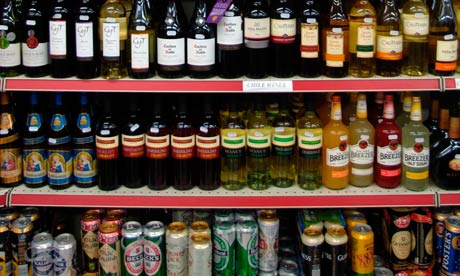Andrew Lansley, the already embattled health secretary, went along with the industry line. There was no evidence that putting up prices would curb dangerous drinking, he said. But the prime minister, who has backed him over the health and social care bill, is parting company with him on this. David Cameron has already dropped hints that he may support minimum pricing. Lansley-watchers may be wondering whether this is a further indication that the health secretary's career is on the skids.
Nobody underestimates the damage done by drinking today. City streets are full of shouting, brawling young people as the clubs and pubs spill out and many of them do their sobering up in A&E. The cost to the NHS is £2.7bn, including £1bn spent in A&E. Then there is the crime and disorder on the streets, the accidents and the domestic violence – in all of which innocent, non-drinking people can be killed. Although Cameron puts the emphasis on young drinkers, older drinkers cause huge harm too. And deaths from alcohol damage are a major concern.
Lansley's answer was a responsibility deal with the alcohol industry, which argues that the vast majority of people drink responsibly and should not be penalised for the sins of the few. The industry promised education campaigns. Just over a week ago, Lansley praised retailers including the Wine and Spirit Association for a national campaign to tell people how many alcohol units their drink contains.
But major health groups, including the British Medical Association and the Royal College of Physicians, walked out of negotiations over the alcohol responsibility deal a year ago, and it has been a one-sided affair since. The main bone of contention was Lansley's refusal to allow discussion of price.
An influential voice in Cameron's ear appears to have been Tory MP Sarah Wollaston, a Devon GP who is very concerned about excess drinking. She is one of those who has put the case of the health lobby.
An influential argument is that Scotland's pioneering decision to introduce minimum unit pricing is expected to produce dramatic results in a short space of time. Within two years, liver specialists say, deaths directly from alcohol should drop markedly. Unit pricing will push up the cost of the strong ciders bought by chronic alcoholics. At the moment, they cost 15p a unit. In Scotland they will go up to 45p a unit.
Those whom liver specialist Dr Nick Sheron sees with liver failure in Southampton hospital are consuming 40 to 100 units a week. "Of the people I see, 50% stop drinking," he said. "I tell them they need to stop drinking because they will be dead otherwise. Once you stop drinking, people continue to die for 18 months to two years, but after that the survival curve is pretty flat."
Work carried out at Sheffield University – hotly disputed by the drinks industry – shows that raising price cuts drinking. The anticipated drop in deaths in Scotland will be noticeable within a couple of years, argues the health lobby. The prospect of a U-turn close to an election could be a factor in Downing Street's new attitude to the pricing issue.
The other critical question is whether Scotland's unit pricing will be blocked by the EU. The drinks industry says it is illegal – something that was repeated by the public health minister, Anne Milton, last October at the science and technology select committee. But the health lobby disputes this, claiming that EU rules merely prevent prices being set for UK-produced drinks which are different from those imported from other countries.
